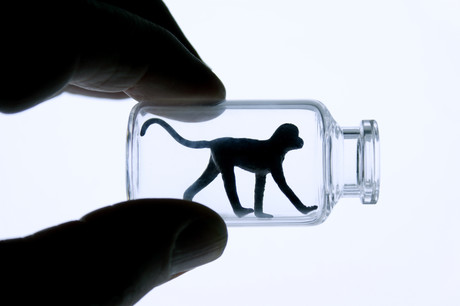Study raises concerns over animal trials

An investigation into testing of a new tuberculosis vaccine has suggested the researchers misrepresented the results of animal studies to gain funding and approval for further trials.
The vaccine, developed by researchers at Oxford University, was reported to be effective in animal studies but did not show a benefit in human trials. An investigation by The BMJ found that weak results from a monkey study were not included in submissions for funding and approval for human trials, raising concerns about systematic failures in preclinical animal studies, the precursors to human clinical trials.
Led by The BMJ’s Associate Editor, Dr Deborah Cohen, the investigation and linked expert commentaries highlight the “pick and mix” approach to animal research and raise wider questions about lack of oversight and transparency, unaccountable regulatory decision making, and lack of clarity about what data are required when deciding to move from animal (preclinical) studies to human (clinical) trials.
Whereas in clinical medicine, clinical trial registries help prevent selective presentation of evidence, there is no comparable mechanism for preclinical evidence.
As such, experts warn that this investigation is just one example of “a systematic failure” afflicting preclinical research and call for urgent action “to make animal research more fit for purpose as a valuable and reliable forerunner to clinical research in humans”.
The investigation focuses on MVA85A, a vaccine developed by researchers at Oxford University to boost the effectiveness of the BCG vaccine and provide extra protection against tuberculosis, which kills over a million people a year.
It was reported to have been shown to be effective in animal studies, but failed to show benefit when tested in a large clinical trial in South African infants in 2009.
The BMJ has been told that this apparent disparity between the animal and human results has led major funders of TB research to rethink their funding priorities, with allegations that this has slowed progress in the entire field.
But an independent systematic review in 2015 concluded that the results of the animal studies had been overstated.
And it appears that while the clinical trial was in the late stages of preparation, a study in monkeys should have raised doubts about the effectiveness of MVA85A. Although the monkey study was too small to draw firm conclusions, the results sparked concerns in academic circles.
Yet several months after the monkey study ended, it appears that these results were not included in information submitted to regulators for approval and funding of human trials of MVA85A.
While publicly relying on claims that the vaccine had been shown to be safe and effective in animal studies, the Oxford researchers played down their significance when speaking privately.
The BMJ investigation also shows the difficulties in obtaining basic information, such as the study protocol and the application for ethical approval to conduct the study, leaving questions about the exact purpose of the monkey study unanswered.
Jonathan Kimmelman, Associate Professor in the Biomedical Ethics Unit at McGill University in Canada, said that this is not an isolated case. “It’s widely recognised that animal studies intended to support drug development are often riddled with flaws in design and reporting. But it sometimes feels as if regulators and ethics committees missed the memo. Unfortunately, there are other cases where new treatments were put into human testing on animal evidence that was foreseeably flawed, incomplete or even negative,” he said.
In a linked editorial, Malcolm Macleod, Professor of Neurology and Translational Neuroscience at the University of Edinburgh, said, “We need to develop better and more systematic ways to establish when a drug is ready for clinical trials in humans — and importantly, when it is not.”
The story of MVA85A also raises questions about how researchers and institutions respond to criticism, he added. “Until our institutions recognise that their core purpose is to produce research of value to society they risk a slow decline in their reputation, and possibly a faster and more serious erosion of public trust in science. In these troubled times that public trust is more important than ever.”
Finally, Merel Ritskes-Hoitinga and Kim Wever at the Department for Health Evidence in The Netherlands have said improvements in the design, registration, reporting, appraisal and transparency of animal studies are urgently needed. They call on funders, journals, regulators, academia and ethics committees to lead “a culture change” to realise the potential of animal studies to transform human health.
Breakthrough blood test for endometriosis developed
Scientists identified 10 protein biomarkers, or 'fingerprints' in the blood, that can be...
A simple finger prick can be used to diagnose Alzheimer's
A new study is paving the way for a more accessible method of Alzheimer's testing, requiring...
Experimental blood test detects early-stage pancreatic cancer
The new test works by detecting two sugars — CA199.STRA and CA19-9 — that are...




